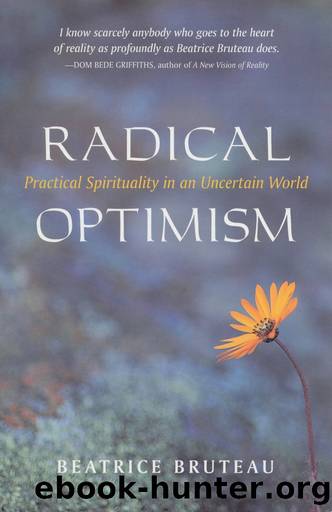Radical Optimism by Beatrice Bruteau

Author:Beatrice Bruteau
Language: eng
Format: epub
Publisher: Sentient Publications
Published: 2002-01-15T00:00:00+00:00
The Descriptive Self
Let us analyze this loss in greater detail. We begin with the descriptive self. It is identification with the descriptive self that makes evil acts, or sin, possible. Not inevitable, just possible. The description consists of all those categories and quality or quantity ratings by which we customarily introduce ourselves to others and image ourselves to ourselves: our occupation, our relation to spouse or parent or child, our nationality, our religion, our race, our wealth, our fame, our achievements; perhaps even some special feature that looms large in our social life, such as sexual orientation or some physical or mental handicap, or a drug dependency or a prison record. And how many of us build our lives around the particular description we give in these terms.
This is how we think of ourselves and how we think of other people. Our self-esteem and our sense of having a satisfactory life are framed in these terms. We struggle and strain to be able to say to ourselves and others, I have the description that is valued in this society. Or, if we cannot attain that, then we try to get the description that we do have valued: we declare that being the way we are is just as good and beautiful and natural and proper as being the way they are. But we still think that we are that description. And our life consists of trying to get the description valued or trying to get the valued description. It doesn't occur to us that our value doesn't lie in the description at all.
Another thing that happens when we define ourselves by descriptions and comparison and relations is that the value comes from scarcity and envy. As long as I have the only Mercedes-Benz on my block, I'm an important person. When every garage on the street has a Mercedes in it, it doesn't count anymore. It was the comparison, the contrast, that gave the value and gave me a sense of who I am. Similar things are true of our sense of achievement. If everyone can run the four-minute mile, I have no sense of accomplishment in it. All this seems quite right to us. We even have a wise saying, "Where all are honored, no one is honored." Our notion of value seems to be that in order for it to be valued it has to be scarce. There must be not enough to go around. It's the fact that some peopleâeven most peopleâdon't have it that makes it valuable, that makes it good. Deprivation, nonbeing, is the foundation of this sense of value.
Our feeling good about ourselves thus depends on other people feeling bad. They must wish that they could have what we have, or do what we do, and not have it, in order for our possession or our achievement to be important. If no one else wanted to have it or do it, then even if I were the only one in the world to have it or do it, I would be worthless.
Download
This site does not store any files on its server. We only index and link to content provided by other sites. Please contact the content providers to delete copyright contents if any and email us, we'll remove relevant links or contents immediately.
The Secret Power of Speaking God's Word by Joyce Meyer(3142)
Signature in the Cell: DNA and the Evidence for Intelligent Design by Stephen C. Meyer(3116)
Real Sex by Lauren F. Winner(3000)
The Holy Spirit by Billy Graham(2932)
The Gnostic Gospels by Pagels Elaine(2515)
Jesus by Paul Johnson(2347)
Devil, The by Almond Philip C(2321)
23:27 by H. L. Roberts(2236)
The Nativity by Geza Vermes(2217)
Chosen by God by R. C. Sproul(2148)
All Things New by John Eldredge(2145)
Angels of God: The Bible, the Church and the Heavenly Hosts by Mike Aquilina(1948)
The Return of the Gods by Erich von Daniken(1923)
Angels by Billy Graham(1914)
Knowing God by J.I. Packer(1842)
Jesus of Nazareth by Joseph Ratzinger(1795)
The Gnostic Gospel of St. Thomas by Tau Malachi(1778)
Evidence of the Afterlife by Jeffrey Long(1773)
How To Be Born Again by Billy Graham(1770)
